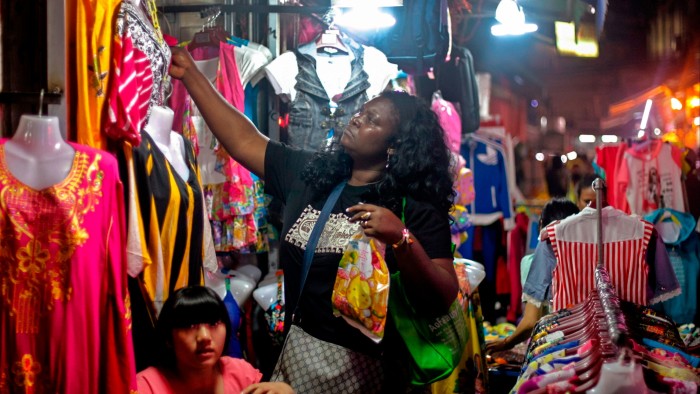Unlock the Editor’s Digest for free
Roula Khalaf, Editor of the FT, selects her favourite stories in this weekly newsletter.
Other than his native Tanzania, 32-year-old businessman Justice George Kaundama is interested in only one country.
“China-Africa is the future,” he says, sitting on the veranda of Shamwaa, the Tanzanian restaurant he opened last year in Guangzhou. “We are going to be big partners.”
Kaundama first came to the southern Chinese city, known for decades as China’s “Little Africa”, in 2018. After studying Mandarin for two years, he opened a logistics company shipping Chinese goods back to Tanzania. He came to China to get rich. More than six years in, he says he is getting there.
Kaundama is one of tens of thousands of African migrants drawn to Guangzhou by its giant wholesale markets, which connect African buyers with the bounty of China’s sprawling manufacturing base.
Estimates for the number of Africans in Guangzhou vary wildly, partly due to the mix of full-time residents and transitory traders on short trips in the city. Pre-Covid, officials put the number between 10,000 and 20,000.
This is a relatively small community in a city with a permanent population of nearly 19mn. But Africa’s influence on Guangzhou, which has been China’s pre-eminent foreign trade hub for centuries, is evident. Traders here can place bulk orders for traditional North African gandoura tunics and Nigerian gele head wraps, then fuel up on food from across the continent in restaurants tucked in the backstreets of Xiaobei and the industrial suburbs of Baiyun.
Although widely documented racist treatment and evictions during the Covid-19 pandemic led many to leave, threatening the existence of the decades-old community, it appears to be recovering.
This recovery is explained by the irresistible pull of the vast Chinese manufacturing base, African traders told me. On a continental level, trade between China and Africa reached nearly $300bn last year and Beijing is now the number one trading partner for the continent.
Still, Covid was “very hard”, says Kaundama. Social media videos from the time depict stand-offs between security guards and evicted residents, many of whom were forced on to the street. “The rumour was [that] African people bring Covid. So everybody’s afraid of African people,” he recounts.
Even now, after two years living in his current apartment in an upmarket neighbourhood, he is regularly challenged by security guards when he returns home.
But African residents who spoke to the Financial Times said the situation has improved markedly since the pandemic was brought under control. They pointed to visas and work permits being issued more quickly — a fact corroborated by two visa agents I spoke to who handle Africans’ applications — and said both business registration procedures and authorities’ general demeanour had eased.
Yoofi Greene, who arrived in Guangzhou from Ghana in 2014 to study international trade, said Chinese people were also taking more of an interest in African culture. He teaches a weekly Ghanaian azonto dance class to local students, who can then show off their skills at increasingly popular African nights in the city’s clubs.
The increase and diversification of African interests in China runs counter to a rapid withdrawal of westerners. It also debunks concerns that the rise of ecommerce platforms such as Alibaba, which connect African markets directly to Chinese factories, would lead to a decline in in-person exchanges and hollow out the number of Africans who live here.
Josephine, a Kenyan businesswoman who runs two restaurants in the city, said China was “difficult” when she first arrived. She also had to get used to locals staring at her and moving seats when she sat with them on public transport.
“I tended to see that police in general were very strict and not very friendly to us then. But now things have changed,” she said. “I have been through ups and downs but my 14-year stint in China has been quite fruitful. Guangzhou has been good to me.”
